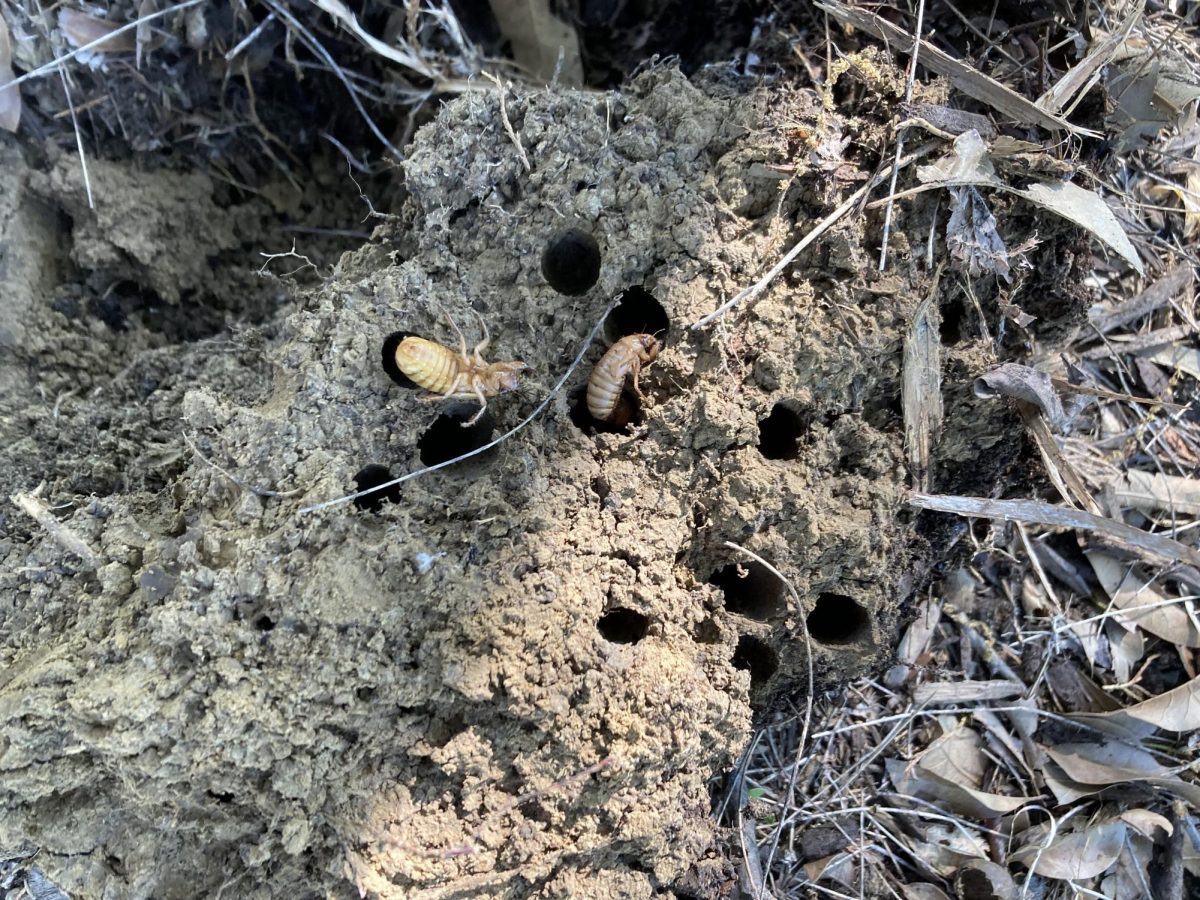Only a year after moving to St. Louis, Ed Bolton, chemistry teacher, experienced a massive emergence of periodical cicadas in 1986.
“They were everywhere. They covered the grass and the cars,” Bolton said. “We’d be playing baseball in the backyard, and you could hear people run because the ground was crunchy with cicadas.”
Cicadas are large insects that stay underground for varying durations of time. Annual cicadas emerge from late May to early June every year, and periodical cicadas emerge every 13 or 17 years.
Brood 19 emerges every 13 years, and Brood 13 emerges every 17 years. Both broods will emerge with annual cicadas later this spring.
They were everywhere. They covered the grass and the cars. We’d be playing baseball in the backyard, and you could hear people run because the ground was crunchy with cicadas.
— Ed Bolton
Sharon Dobesh-Beckman, entomologist and pesticides branch outreach coordinator for the Environmental Protection Agency (EPA), said these two broods have not emerged together in more than 200 years.
While annual broods, like dog-day cicadas, will be present, Dobesh-Beckman said there will be several significant differences in this year’s cicada emergence compared to previous years.
“The physical appearance of the cicadas will be different, and because these cicadas come out after such a long period, they come out in much larger numbers,” Dobesh-Beckman said.
Some areas may see hundreds of periodical cicada insects over an acre, Dobesh-Beckman said.
Cicadas are completely harmless to humans, but their loud buzzing noise may be challenging, especially in areas with large cicada populations, Dobesh-Beckman said.
“The decibels they produce have been compared to that of a lawnmower, so imagine a lot of lawnmowers going off at the same time,” Dobesh-Beckman said.
Cicadas insert their eggs into small tree branches shortly before they die. Twigs may eventually appear to split due to this egg laying, Dobesh-Beckman said.

“Next spring, after the winter, is when you may even see more of that damage come to light,” Dobesh-Beckman said. “If young trees sustain heavy damage, they could die because they can’t withstand that much physical damage.”
When Cicadas die in large numbers, their decaying bodies may accumulate and produce an unpleasant odor, requiring cleanup in some areas.
Despite these challenges, Dobesh-Beckman said the emergence is natural and beneficial for many ecosystems.
“Cicadas live underground, so their emergence helps aerate soil. Even though some people will notice those holes and consider them unsightly, they’re actually a good thing for the environment,” Dobesh-Beckman said. “The cicadas are also very beneficial for a lot of birds, insects and small animals that will utilize them as protein-rich food.”
Managing the emergence of cicadas is difficult, especially due to the rarity and scale of the event, Dobesh-Beckman said. Pesticide use is not recommended, as it could poison animals that consume cicadas. The duration of the emergence is only two to three weeks, so waiting it out and managing cleanup will be the best course of action, Dobesh-Beckman said.
“When we have all those extra dead insects around, just sweep them up and put them in a place where they can decompose and return nutrients to the soil,” Dobesh-Beckman said.
Cicadas live underground, so their emergence helps aerate soil. Even though some people will notice those holes and consider them unsightly, they’re actually a good thing for the environment.
— Sharon Dobesh-Beckman
Josh Wyckhouse, junior, said he witnessed a large cicada emergence when he was young.
“There were cicadas everywhere; they were in the trees, on the ground,” Wyckhouse said.
White said cicadas significantly affect dogs because dogs like to eat them. Wyckhouse’s family plans to keep their household dog from consuming too many.
White said the large amount of cicadas in the air may cause visibility issues for drivers and require them to be more vigilant.
“Mainly, they’re very annoying and very loud,” Wyckhouse said.
By the end of the summer, Bolton said the presence of cicadas feels normal.
“As a kid, two or three of my friends had dogs, and it was a contest to see who could eat more of them in like 15 minutes,” Bolton said. “You’re not gonna make them go away. Being mad doesn’t do you any good, so make a game out of it.”











